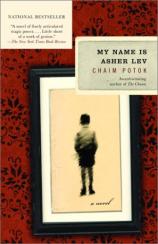My Name Is Asher Lev
Review
My Name Is Asher Lev
At once exquisitely understated and elegantly articulated, Chaim
Potok's MY NAME IS ASHER LEV focuses on a man who treads the
nebulous boundary between the secular and the spiritual. His
protagonist, Asher Lev, is a Ladover Hasid from Brooklyn who is
raised in a world saturated with ritual and led by a charismatic
Rebbe. Asher keeps kosher, attends yeshiva and believes in the
Ribbono Shel Olom, the Master of the Universe. But he's also an
artist who's driven to render the world in all the raw beauty and
power he sees in it. The inevitable friction this causes between
Asher and his deeply religious community both inspires and impedes
his artistic evolution.
As Asher enters religious school, the Rebbe acknowledges that his
gift can't be denied and introduces him to Jacob Kahn, a renowned
Jewish artist who was a contemporary of Picasso. Kahn, a
non-observant Jew, takes Asher under his wing and mentors him,
encouraging him to express himself even when it leads Asher to
blasphemy.
A major focus of the novel is the tension between Asher and his
deeply religious parents, particularly his father Aryeh. Although
everyone in Asher's life recognizes his immense talent at a young
age, his father steadfastly refuses to accept it, asking his son
when he'll give up that "foolishness." Aryeh Lev is an almost
larger-than-life figure in their Brooklyn Hasidic community,
working closely with the Rebbe and traveling often. He does God's
work, passionately dedicated to helping persecuted Jews start a new
life in America and setting up Ladover yeshivas throughout Europe.
The juxtaposition of his father's sacrifice for the Jewish people
and Asher's own reluctance to assume such a responsibility is a
particularly painful one for both of them.
His compulsion to paint not only alienates Asher from his childhood
world, but also causes divisions between members of his own family
when an uncle offers his attic for a studio space. One especially
poignant scene comes when Asher is already a household name and his
parents finally make it to one of his shows. They walk out in
disgust at paintings that incorporate Christian iconography, works
they consider deeply antagonistic to their faith.
As the novel traces Asher's struggle to express himself while
remaining entrenched in the Hasidic community, Potok paints a
luminous portrait of the artist's sometimes tortured existence
without lapsing into cliché. His characters are deftly drawn
--- as Asher grows into an adult, you acutely feel the crushing
weight of his responsibility to the Jewish people versus a
responsibility to his gift. The trouble Asher causes weighs heavily
on his mind, yet he's powerless to stop himself. In one telling
segment, he inadvertently draws a face on his Chumash, a Jewish
holy book, much to the horror of his surrounding classmates. To the
wise Rebbe, however, this only signifies that Asher possesses a
gift that cannot be disavowed.
Those not schooled in Jewish tradition will encounter many
unfamiliar terms, but they're couched in context, so Potok's
attention to detail serves to breathe life into the text, not
confuse the reader. The end result is a novel that deals with
sweeping themes --- the nature of art, religion and family bonds
--- with elegance and grace.
Reviewed by Jen Robbins on January 22, 2011
My Name Is Asher Lev
- Publication Date: March 11, 2003
- Genres: Fiction
- Paperback: 369 pages
- Publisher: Anchor
- ISBN-10: 1400031044
- ISBN-13: 9781400031047










